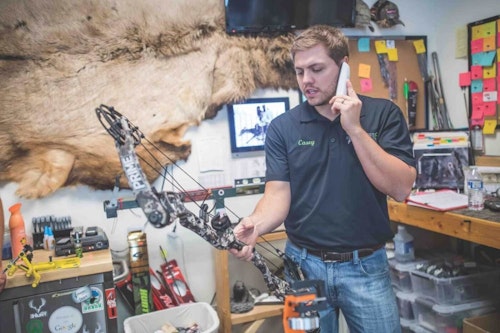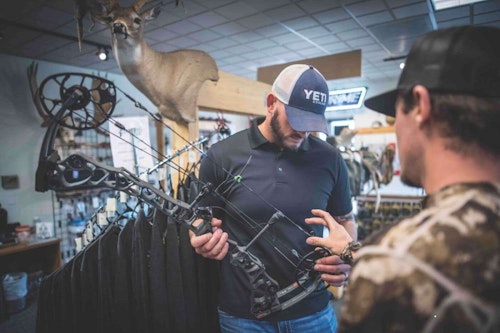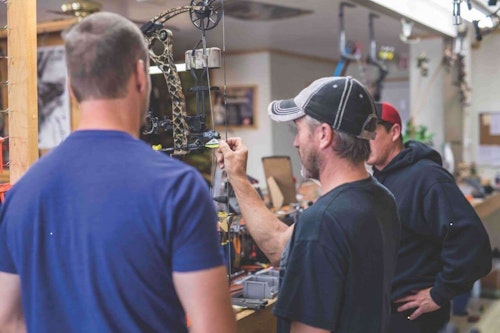A good team is everything, especially in business. Having the right people on your team makes the difference in whether customers come to your establishment or your competition that lives down the road. Finding that person to add to your staff is an incredibly important process.
In an age of inflation, a lot of archery shop owners are taking on extra loads and doing everything themselves. Still, as our world gets busier, it continues to get more difficult to do this, though.
If things go well, at some point, archery shop managers are going to grow their business, and they’re slowly going to fall behind because they can’t keep up with everything. And only those who continue to adapt and overcome will ensure their businesses last well into the future. Sometimes, this means hiring someone. For those looking to expand their team, here are some ways to spot a good hire.
1. Look Around You
Those who already have a sizeable staff should consider looking inward to fill necessary roles. Oftentimes, internal team members aspire to move upward, and if the open position is a promotion, overlooking them will quickly demoralize the team. If someone on the team is the right fit, it’s oftentimes good to consider promoting from within, and hiring to replace them. So, look around you.
2. Cast a Wide Net
When you’re looking to hire an individual, it can take some time to discover and onboard the person you’d like for the position. Your odds of finding the right person increase with more interviews. Don’t rush the process. Let it come together as it’s meant to.
“Sometimes, it can take a few months to really find someone who is the right hire,” said Allen Thomas, owner of the Hunter’s Den archery shop in Kentucky. “I’ve had spur-of-the-moment hires, and they do well for a while. If you just need some part-time help for a month or two, that might be alright.”
But those who are looking for a great long-term employee shouldn’t be hasty unless they know for certain it’s the right individual. Basically, it’s usually the wrong move to hire the first (or only) person you interview.
3. Use Social, Postings, and Boards to Find Candidates
In the age of technology, there are numerous ways to find candidates to interview. Social media resources, job board postings, headhunters, and other tools are available to find potential employees.
4. Look Over Their Social Media Pages
It’s always good practice to view each candidate’s social media pages. Look for red flags, such as posts that reflect irresponsibility, untrustworthiness, general drama, and other unwanted characteristics and factors.
It’s also important to look for mutual friends. If you share some, these can be contacted as unofficial references. You’re more likely to get an honest response from these than the references who have been asked, or even groomed, by the applicant.
5. Recruit the Person You Want
If you already know of a great potential employee, it’s crucial to reach out to them. Encourage them to apply for the job. Don’t just hand it to them, though. You still need to expand the search, and you must interview other candidates. You never know; you just might find someone you weren’t aware of previously.
6. Review a Great Application
A good application is a sign of professionalism, responsibility, and more. It isn’t the be-all-end-all. Great applications can also hide undesirables within the candidate. Still, a great application is generally a good sign rather than a bad one.
7. See and Hear Rock-Solid Referrals and References
A good set of character and skill references can boost your confidence in hiring someone. If they have great things to say, awesome. If not, that isn’t a good sign. Sure, these are hand-selected by the applicant, but most people are honest. Furthermore, if few or none of the references are people they’ve recently worked with, that can be a red flag. Analyze the composition and relationships between the applicant and references and interpret the results how you will.
8. Do a Background Check
Conducting a background check is certainly an important step. Few applicants are perfect (if there is such a thing). But you will find things you are comfortable with, and things you aren’t. Be prepared to know what those are when considering candidates.
9. Talk Via Phone First
Humans are influenced by each of the senses, including sight. We oftentimes judge based on what we see, and generally not for the better. That makes it crucial to conduct the first interview, or at least first conversation, via phone. This helps to build a more accurate perception of someone without the influence of visual and physical factors.

10. Measure Commitment and Capability
Today, it can be difficult to find someone with the required experience to work in an archery shop. “It’s pretty hard,” Thomas said. “And if you do, come hunting season, a lot of the time they are gone. Or, if they’re a tournament shooter, they are gone some. It just seems like some people will do well for the first few months, but as time goes on, they lose their ambition.”
11. Ask the Right Questions
A good interviewer will ask questions. This will include basic, general, skill-related, compatibility-based, and deep-diving questions. Be creative with your conversations. Standard, run-of-the-mill questions are okay, but draft some of your own. Challenge the interviewee. Put them in difficult professional scenarios, but in a proper and respectful manner. Examine how flustered or smooth they remain under pressure.
12. Let Other Employees Interact
Unless you’re a one-man team, don’t be the only person to interact with the interviewee. Allow other, trusted employees and team members to interact with them. They’ll be working with them, too, and it’s important that everyone is on board with a new hire. Introducing someone new to the mix influences workplace chemistry, and it needs to remain a good environment.
13. Listen to Verbal Communication
An intelligent, charismatic person is good at watching what they say and how they respond to questions. A smart interviewee will even find a way to turn negatives into positives, if the conversation goes in that direction. Analyze how they direct the conversation, and how they respond to difficult questions.
14. Watch Their Body Language
Humans are generally good at screening their own speech. They’re less adept at screening their non-verbal communication, also known as body language. Look for good posture, which indicates attentiveness and interest. Hand gestures, facial cues, and other non-verbal signals are also part of healthy communication and can indicate what someone is thinking or feeling. Furthermore, those who make proper eye contact tend to show more respect. Those who show too much eye contact can also be a red flag. But that’s an entirely different discussion.
15. Measure Their Patience Levels
Keeping a conversation going (and going in a positive direction) is crucial. You must consider how they’re going to be as an employee, and how they will be with customers. All members of your staff need patience, especially in challenging situations.
“They need a lot of patience,” Thomas said. “That’s always key. It takes someone with care and respect who cares about that customer’s needs. You must take care of the customer whether you know them or not. A staff member must take care of that customer as if they were a friend. Always treat people like you’d want to be treated.”
16. Ask for Ideas
A good employee will do their job. A great one will bring something more to the table. Ask interviewees for ideas on concepts that you’re working on. Or, if you don’t want to share such information prior to hiring, offer some hypothetical scenarios and receive their input. Gauge if they can brainstorm great ideas.
17. Determine Self-Awareness Levels
An individual who is self-aware will be able to grow as a person and employee much quicker and more efficiently than someone who isn’t not introspective or self-aware. Bringing someone on board who can reflect on themself, and make necessary changes, is likely someone worth having.
18. Inquire About Education
Education is great. It shows that someone can learn, and that they are likely trainable. But it isn’t a requirement. Don’t ignore a promising applicant on the lack of a degree or formal education alone. After all, in many instances, experience and work history are more beneficial to an employer than a college education without these things.
19. Consider Work History
Reflecting on their past jobs is important. Analyze how long they worked there, too. Someone who stays for a year or less before jumping ship shows they might lack commitment and loyalty. It also could signify other challenges. This isn’t a guarantee, and not a blanket statement situation, but it’s something to look for and subsequently consider.

20. Gauge Coachability
A lot of jobs require relevant prior work history or education. When looking at candidates and their expertise, it might be necessary to choose between someone who is not as experienced but has the better attitude, versus someone who does have that work history but isn’t as coachable.
“I think it would be more important to have someone who you can train,” Thomas said. “It would be possible to teach your way of doing things, rather than someone who always thinks they’re right. You could train them like you would want it done.”
21. Do a Walk Through
During the interview process, walk through your establishment with the applicant. Observe how engaged and interested they are. Good energy shows they are excited about the opportunity. Negative energy or apathy generally signifies indifference at best.
22. Observe How They Treat Others
You want someone who is going to treat others kindly and with respect. Those who don’t treat others the way they would like to be treated oftentimes create problems in the workplace. It can even lead to issues with customers, which businesses can’t afford, especially in this economic environment.
23. Determine Their Passion Level
More times than not, an employee who loves what they do, and who is passionate about the subject, is going to do a better job, and for longer, than someone who doesn’t enjoy the subject. “You need someone who has a love of the sport, whether it be the hunting or shooting sports,” Thomas said. “If they have a love of it, most of the time, they’ll do well.”
24. Grab a Meal Together
People’s personalities come out when they eat together. This helps them be more comfortable with you, and you with them. Then, everyone can start to get to know the true versions of each other, which is who you’ll see in time after someone is hired.
25. Help Drop Their Guards and Walls
As with sharing a meal, there are other things that help people willingly let down their walls and express their true self. Use these methods to see how courteous they are in their true personality and format. If you like what you see, great. If not, respectfully move on.
26. Conduct Multiple Interviews
If you’re the lone ranger in the business, this isn’t possible. But if there are other managers and professional employees in the workplace, ask them to conduct an interview with the applicant. This helps you to get multiple opinions. People oftentimes catch things others miss, and vice versa.
27. Give Them a Task
At the end of the interview process, give the applicant a task on the spot. See how they perform. If they do well, provide a longer task they must take home with them. Let them set their own deadline to gauge work ethic.
28. Recognize a Good Deal
Always pay employees what they are worth, and that which you can afford. However, some people will ask for certain pay levels. While reviewing the applicants, gauge how they ranked, and compare that to what the starting pay levels would be. Find where, and with whom, resides the best value.
29. Don’t Hire Yourself
Generally, humans hire people who make them comfortable. Usually, that’s someone like themselves, which can be a mistake. Instead, hire a good applicant who checks the right boxes, but who also has complimentary skills, strengths, and abilities that you aren’t already equipped with. This will make them more valuable to you and your business.
30. Listen to Your Gut
“Gut feelings” aren’t always correct, but oftentimes they are worth considering. If your instincts turn out to be true more times than false, remember it. It’s there for a reason, and is something you should factor in the hiring process.
Final Thoughts
Those who plan to hire and train a new member of the team should understand it isn’t always a quick process. It takes time to coach up someone in a new role, but that shouldn’t discourage owners and managers from doing so. While the process will look different for everyone, don’t let it distract or intimidate you. If you’ve determined that another team member is vital for success, continue onward toward the goal, especially once you spot a good hire.
Sidebar: Qualities of a Good Hire
A good hire will express certain characteristics and qualities. They might not check every box, but they have the majority of the following:
- Has a good application
- Offers good references
- Thinks critically and logically
- Communicates very effectively
- Answers interview questions honestly and wisely
- Has good character
- Expresses concern for others
- Shows compatibility with the team
- Proves commitment to the mission
- Interacts well with others
- Treats everyone with respect
- Is eager to learn
- Understands the trade
- Is in tune with the industry
- Is knowledgeable of the company.
Sidebar: Interview Questions
Interviewers should ask appropriate questions that remain within the boundaries, but also help produce answers beneficial for making a hiring decision. Some good questions include:
- What’s the history of our organization?
- What’s our mission statement?
- What are your biggest strengths and weaknesses?
- What are your biggest wins and failures professionally?
- What is a challenge you faced, and how did you respond?
- What is one time you failed, and how did you respond?
- What quality do you like most about yourself?
- What quality do you like least about yourself?
- Where do you see yourself in 5 years?
While these are options, it’s important to craft your own. Ask questions that prompt answers to the questions, concerns, and inquiries you have with the role you intend to fill, and those who are applying to fill it.
Photos by John Hafner







